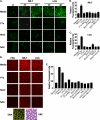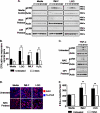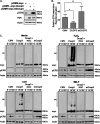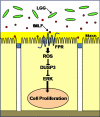Enteric commensal bacteria induce extracellular signal-regulated kinase pathway signaling via formyl peptide receptor-dependent redox modulation of dual specific phosphatase 3
- PMID: 21921027
- PMCID: PMC3207424
- DOI: 10.1074/jbc.M111.268938
Enteric commensal bacteria induce extracellular signal-regulated kinase pathway signaling via formyl peptide receptor-dependent redox modulation of dual specific phosphatase 3
Abstract
The normal microbial occupants of the mammalian intestine are crucial for maintaining gut homeostasis, yet the mechanisms by which intestinal cells perceive and respond to the microbiota are largely unknown. Intestinal epithelial contact with commensal bacteria and/or their products has been shown to activate noninflammatory signaling pathways, such as extracellular signal-related kinase (ERK), thus influencing homeostatic processes. We previously demonstrated that commensal bacteria stimulate ERK pathway activity via interaction with formyl peptide receptors (FPRs). In the current study, we expand on these findings and show that commensal bacteria initiate ERK signaling through rapid FPR-dependent reactive oxygen species (ROS) generation and subsequent modulation of MAP kinase phosphatase redox status. ROS generation induced by the commensal bacteria Lactobacillus rhamnosus GG and the FPR peptide ligand, N-formyl-Met-Leu-Phe, was abolished in the presence of selective inhibitors for G protein-coupled signaling and FPR ligand interaction. In addition, pretreatment of cells with inhibitors of ROS generation attenuated commensal bacteria-induced ERK signaling, indicating that ROS generation is required for ERK pathway activation. Bacterial colonization also led to oxidative inactivation of the redox-sensitive and ERK-specific phosphatase, DUSP3/VHR, and consequent stimulation of ERK pathway signaling. Together, these data demonstrate that commensal bacteria and their products activate ROS signaling in an FPR-dependent manner and define a mechanism by which cellular ROS influences the ERK pathway through a redox-sensitive regulatory circuit.
Figures






References
Publication types
MeSH terms
Substances
Grants and funding
LinkOut - more resources
Full Text Sources
Molecular Biology Databases
Miscellaneous

